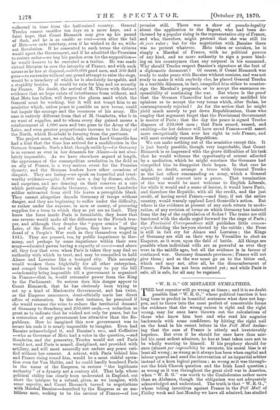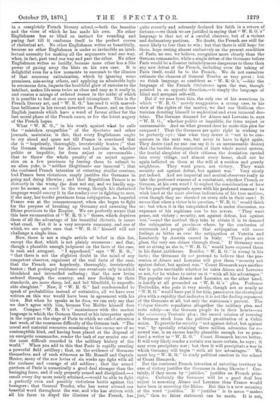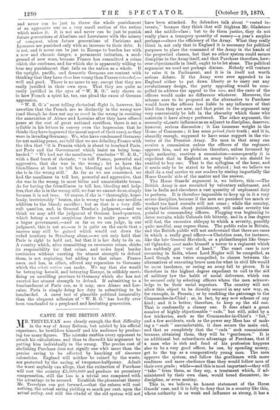" W. R. G." ON MISTAKEN SYMPATHIES.
THE best repeater will go wrong at times ; and it is no doubt possible that " W. R. G.," whose political function it has. long been to predict in beautiful sentences what does not hap- pen, and to throw into the most perfect of conceivable forms the evidence that the wrong course is right and the right wrong, may for once have thrown out the calculations of those who know him best and who read his auguries backwards with some confidence, by hitting the right nail on the head in his recent letters in the Pall Mall declar- ing that the case of France is utterly and irretrievably hopeless. But even if he should for once have thus mis- led his most ardent admirers, he has at least taken care not to. be wholly wanting to himself. If his prophecy should for' once (almost per impossibile) be accurate, his moral bias is at least all wrong ; as wrong as it always has been when capital and labour quarrel and need the intervention of an impartial arbiter' instead of a keen logical partizan ; as wrong as it was through- out the Irish Church question and the Irish Land question ; as wrong as it was throughout the great civil war in America, when " W. R. G." was worth to the Confederates rather more than an Alabama, though the obligation was not adequately acknowledged and understood. The truth is that " W. R. G.," whose telling invectives against France in the Pall Mall of Friday week and last Monday we have all admired, has studied
in a completely French literary school,—both the beauties and the vices of which he has made his own. No other Englishman has so blind an instinct for rounding and paring fact till it conforms itself to the perfect curves of rhetorical art. No other Englishman writes so beautifully, because no other Englishman is under so invincible an intel- lectual necessity for making all the arguments tend one way, when, in fact, part tend one way and part the other. No other Englishman writes so lucidly, because none other has a like power of gazing away the blots on his own case. It is delightful even for a few moments to succumb to the illusion of that sonorous ratiocination, which by ignoring some premisses, mis-seeing others, and applying an admirable logic to erroneous data, imparts the healthful glow of exercise to the intellect, makes life seem twice as clear and easy as it really is, and creates a mirage of ordered reason in the midst of which it is possible to feel at once sure and triumphant. This is the French literary art, and " W. R G." has used it with marvel- lous brilliance in his recent invective on France, and on those English journals which have a word of favour either for the last moral phase of the French cause, or for the latest augury of the French hopes.
What " W. R. G.," in his wrath against what he calls the "mistaken sympathies" of the Spectator and other journals, maintains, is this, that every Englishman ought to cry aloud and spare not till France is convinced that she is " hopelessly, thoroughly, irretrievably beaten ;" that the German demand for Alsace and Lorraine is, whether politic or impolitic, far from unjust or unreasonable ; that to throw the whole penalty of an unjust aggres- sion on a few provinces by forcing them to submit to an alien yoke, is "neither illegitimate nor immoral "; that the confessed French intention of extorting similar cessions, had France been victorious, amply justifies the Germans in going and doing likewise ; and that Republican France is as distinctly in the wrong (he does not say, and we hardly sup- pose he means, as much in the wrong, though his rhetorical language would convey it to the reader) now in fighting to save, if she may, her border provinces from subjugation, as Imperial France was at the commencement, when she began to fight for the purpose of breaking up Germany and annexing the Rhine provinces to the Empire. We are perfectly aware that this bare enumeration of " W. R. G.'s " theses, which deprives them of all the advantage of his beautiful rhetoric, is some- what cruel. Yet it is a very accurate summary, and one of which we are quite sure that " W. R. G." himself will not challenge a single item.
Now, there is not a single article of belief in this list, except the first, which is not plainly erroneous ; and that, though a plausible enough judgment on the facts of the case, is rash and arrogant. " I apprehend," says "W. R. G.," " that there is not the slightest doubt in the mind of any competent observer, cognizant of the real facts of the case, that the French are hopelessly, thoroughly, irretrievably beaten ; that prolonged resistance can eventuate only in added bloodshed and intensified suffering ; that the new levies ordered through the country, and now flocking to their standards, are mere sheep, led, and led blindfold, to unprofit- able slaughter." Now, if " W. R. G." had condescended to speak of probabilities instead of certainties, all we have ever written on this war would have been in agreement with his view. But when he speaks as he does, we can only say that we don't agree with him, because Von Moltke himself does not. Compare " W. R. G.'s " omniscience with the modest language in which the German General or his interpreter spoke in the report on the siege of Paris to which we called attention last week, of the enormous difficulty of the German task. " The moral and material resources remaining to the enemy are of no contemptible kind, and having been placed at the disposal of an energetic commander, render the task of our armies one of the most difficult recorded in the military history of the world." When you add to this that Paris is rapidly creating a powerful field artillery ; that, on the evidence of Germans themselves, and of such witnesses as Mr. Russell and Captain Hozier, many of the raw levies of six weeks ago fight with all the coolness and courage of old soldiers ; that the armed garrison of Paris is numerically a good deal stronger than the besieging force, and if only properly armed and disciplined,—a result every day more nearly attained,—would be able to fight a perfectly even and possibly victorious battle against the besiegers ; that General Trochu, who has never uttered one boastful word throughout the war, and who has striven with all his force to dispel the illusions of the French, has , I quite recently and solemnly declared his faith in a return of fortune,—we think we are justified in saying that " W. R. G.'s" language is that not of a careful observer, but of a violent and declamatory partizan. No doubt, the French are still far more likely to lose than to win; but that there is still hope for them, hope resting almost exclusively on the present condition of Paris, no one, we believe, recognizes more clearly than the German commander, while a single defeat of the Germans before Paris would be a disaster infinitely more dangerous to them than any new defeat of the French, including even the taking of Paris itself, could be to the French. We do not ourselves estimate the chances of General Trochu as very great ; but we think language as confident as " W. R: G.'s,"—like the language of the French litte'rateurs upon the war, though pointed in an opposite direction,—is simply the language of blind and arrogant self-will.
But if we pass from this, the only one of his assertions in which " W. R. G." merely exaggerates a strong case, to his view of the rights of the matter, we find our Gallican rhe- torician devoting himself to sophistical and even immoral doc- trine. The German demand for Alsace and Lorraine is, says " W. R. G.," whether politic or impolitic, far from unjust or unreasonable. And on what ground does he make this plea for conquest V That the Germans are quite right in wishing to be perfectly safe ; that what they desire is " not to be con- querors in the next war, but never to have to fight again. They desire (and no one can say it is an unreasonable desire) that the terrible disorganization of their whole social system, the fearful slaughter of their citizens, the desolation carried into every village, and almost every home, shall not be again inflicted on them at the will of a restless and greedy neighbour. They want peace, not victory. They want security not against defeat, but against war." Very nicely put indeed. And are impartial and neutral observers really to take the professed reasons of a combatant, whether French or German, at his own word ? to neglect the consideration of how far his practical proposals agree with his professed reasons V to wink hard at the most obvious indications of his true motives, even though they are shouted on every side in their ears ? It seems that when a victor is in question, " W. R. G." would think so ; but when it is the vanquished who is under discussion, no exposure of his sophisms can be too severe. " They want peace, not victory ; security, not against defeat, but against war,"—and the method they take to obtain it is to demand the subjugation of provinces where, by the confession of statesmen an3 people alike, that subjugation will cause feelings as bitter as ever the subjugation of Venetia and Lombardy by Austria caused in Italy. "These pleas are glass, the very sun shines through them." If Germany were not so strong as she is, " W. R. G." would have exposed them in his finest antitheses. Besides, " W. R. G." is wrong in his facts ; the Germans do not pretend to believe that the pos- session of Alsace and Lorraine will give them "security not against defeat, but against war." Count Bismarck says another war is quite inevitable whether he takes Alsace and Lorraine or not, but he wishes to enter on it " with all his advantages." The popular cry for Alsace and Lorraine, on the other hand, is hardly at all grounded on " W. R. G.'s " plea. Professor Treitschke, who puts it very nicely, though not so neatly as "W. R. G." would have put it for him, passes over the strategical plea with a rapidity that indicates it is not the darling argument of the Germans at all, but only the statesman's pretext. The Cologne Gazette repudiates altogether the military plea, and rests solely—as the German people do in their hearts—on the missionary Teutonic plea ; the sacred mission of rescuing a German stock from the political prostitution of a Celtic union. To provide for security " not against defeat, but against war," by specially retaining three million advocates for re- newed war, is an excuse hardly plausible enough for so prac- tised a writer as " W. R. G." Count Bismarck knows better. It will very likely render a certain war more certain, he says ; it may even precipitate war ; but then it will precipitate a war in which Germany will begin " with all her advantages." We must beg " W. R. G." to study political candour in the school of Count Bismarck.
But the confessed French intention of extorting territory in case of victory justifies the Germans in doing likewise ? Cer-
tainly, if they mean by "justifies," justifies on French prin- ciples. Certainly the Germans will be a good deal less unjust in annexing Alsace and Lorraine than France would have been in annexing the Rhine. But this is a new meaning of the word "justifies." If " justifies " is to mean "makes just," then no falser statement can be made. It is not and never can be just to throw the whole punishment of an aggressive war on a very small section of the nation which makes it. It is not and never can be just to punish future generations of Alsatians and Lorrainers with the misery of conquest, when future generations of Parisians and Lyonnese are punished only with an increase to their debt. It is not, and it never can be just to Europe to burden her with a new and chronic danger, a permanent irritation, a seed- ground of new wars, because France has committed a crime which she confesses, and for which she is apparently willing to bear any punishment that falls on the nation as a whole. If the upright, pacific, and domestic Germans are content with thinking that they have done less wrong than France intended,— well and good. There is no more to say, except that they are easily justified in their own eyes. That they are quite as easily justified in the eyes of " W. R. G." only shows us in how French a spirit he, too, can plead the cause of German aggression.
" W. R. G.'s" most telling rhetorical flight is, however, his assertion that the French are as distinctly in the wrong now (and though he does not say as much in the wrong in resisting the annexation of Alsace and Lorraine after they have offered peace at the cost of great national sacrifices, there is not a syllable in his letters to convey even the impression that he thinks they have improved the moral aspect of their case), as they were in invading Germany. We, who have condemned Germany for not making peace, are told that we are deluding France with the idea that " it is Prussia which is about to bombard Paris, not Paris and the Government which insist on being bom- barded." " We had not the manliness," concludes "W. R. G.," with a final burst of rhetoric, " to tell France, powerful and aggressive, that she was in the wrong ; let us have the friendliness at least to tell her, bleeding and helpless, that she is in the wrong still." As far as we are concerned, we had the manliness to tell her, powerful and aggressive, that she was in the wrong, in most bitter and unmistakable terms. As for having the friendliness to tell her, bleeding and help- less, that she is in the wrong still, we fear we cannot do so, simply because it is not true. Of course, if she is "thoroughly, hope- lessly, irretrievably " beaten, she is wrong to make any needless addition to the bloody sacrifice ; but as that is a very diffi- cult question, and, in General Trochu's judgment,—and we think we may add the judgment of German head-quarters, which betray a most suspicious desire to make peace with a bogus government,—and so far as we can judge, in our judgment, this is not so,—as it is quite on the cards that a success may still be gained which would cut down the ceded territory to Strasburg alone,—we not only hold that Paris is right to hold out, but that it is her duty to do so. A country which, after committing an enormous crime, shirks its responsibility for that crime, and cedes loyal border territories without exerting its utmost strength to defend them, is not expiating, but adding to that crime. France owes, and has, in effect, offered any reparation to Germany which the whole nation can make. We say that she would be betraying herself, and betraying Europe, in selfishly sacri- ficing an unwilling province to Germany which she has not exerted her utmost strength to defend. If submitting to a bombardment of Paris can, as it may, save Alsace and Lor- raine, Paris is simply doing her duty in submitting to be bombarded. A surer test of plausible political immorality than the eloquent adhesion of " W. R. G." has hardly ever been vouchsafed to a perplexed and hesitating generation.




































 Previous page
Previous page